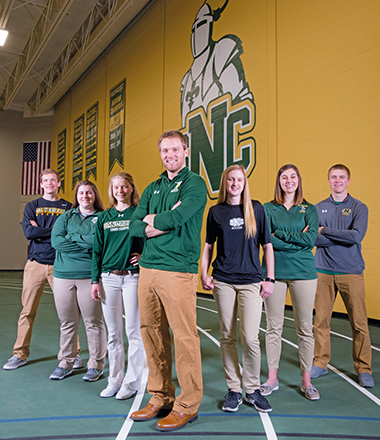Green Knights Dominate the Elites Field
 Eleven SNC student-athletes earned an Elite 20 Award from the Midwest Conference this year, shattering the program’s previous mark for one season and more than doubling St. Norbert’s five awards for 2016-17. Green Knights have received 18 MWC Elite 20 Awards in the three-year history of the award – 10 more than the next closest school.
Eleven SNC student-athletes earned an Elite 20 Award from the Midwest Conference this year, shattering the program’s previous mark for one season and more than doubling St. Norbert’s five awards for 2016-17. Green Knights have received 18 MWC Elite 20 Awards in the three-year history of the award – 10 more than the next closest school.
The Elite 20 awards represent academic and athletics excellence combined and are reserved for just one athlete per sport. The Green Knight MWC Elites represent between them 11 sports – by far the best representation of any school in the conference.
St. Norbert’s award winners were (to the left in our photo) Josh Koleske ’20 (men’s soccer, biology and psychology), Megan Lau ’19 (women’s golf, music education); (to the right) Graceanne Tarsa ’19 (women’s cross country, biology and mathematics, Ellie Lochner ’20 (women’s soccer, mathematics), Samuel Staehling ’20 (football, biology); (not pictured) Taylor Penn ’19 (men’s basketball, biology), Maddie Uhlenbrauck ’20 (women’s tennis, business administration), Alex Vandenberg ’19 (men’s tennis, accounting and economics), David Jensen ’18 (men’s golf, communications), Jack Maastricht ’20 (baseball, economics and mathematics) and Kelly Heniff ’19 (women’s outdoor track & field, education).
To top off this bounty, Clay Van Diest ’19 (center in our photo) garnered the NCAA Elite 90 Award for Division III men’s ice hockey.
“We tell prospective student-athletes that we’ll challenge them when they come here,” says Tim Bald, director of athletics. “People who have more on their plate get the most done. Almost 30 percent of our athletes work, too. These awards prove that we want our athletes to be successful in the classroom as well as their field of play.”
Like many student athletes, Elite 20 tennis player Uhlenbrauck takes a heavier credit load during her sport’s off-season to offset what typically is a lighter load during the fall tennis season. “You have to work out a system every day to know what time to do homework or you will eventually run out of time. In college, you have classes, do homework, have dinner, and then go to practice,” she says. “You’re trying to maximize what you get accomplished during the daytime so you can go to bed at a decent time.”
Learning how much effort is needed to keep up with college coursework compared with high school is a challenge that soccer player Koleske expects to escalate even further when he enters medical school.
“It’s a time-management issue,” Koleske says, noting he has added a part-time job that he will need to balance with soccer commitments in the fall. “You do have enough time, but you have to make sure when you say you’re going to study or work out for your sport that you actually do it during that time.”
Lau, a music major who has to work in practice time on her instruments as well as on the golf course, says: “One thing I had to learn was, I can’t just waste time. I’ll try and get things done in small chunks of time like an hour. If I can even read a couple of pages, that’s something I won’t have to do later. Doing something is better than doing nothing.”
June 30, 2018











